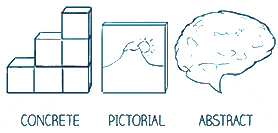
As children head back to school, whether online or in-person, many of them will begin the new school year knowing less than they did before the start of summer vacation. Research tells us that children lose, on average, at least one month of academic grounds over the summer. This is commonly known as summer learning loss, or “the summer slide” as some people refer to it.
Educators have been studying this phenomenon for many years now, since 1996, to be exact, trying to understand why there is such a large learning loss over the summer and how to bridge the gap. There are many theories and findings available for review, with Cooper’s 1996 meta-analysis being among the most well-known. We have compiled everything we know about summer learning loss so far into this short infographic for your review.

This begs the question, is there anything that can be done at home to combat the issue of summer learning loss? In this blog, we will cover a handful of ways parents can get involved in their child’s education and help them climb back up the ladder.
How Can Students Climb Back Up the Ladder?
It all starts with help from parents. Between the summer fun and relaxation, make sure you set some time aside to review math and reading skills with your child. Follow these tips below to get started:
- Keep Up with Math Skills: Years of research indicate that most students tend to lose math skills more than anything else. Since math is an essential part of life, it’s important to keep up, if not sharpen, these skills during their time off. Make sure your investment in your child’s math education does not go to waste over the summer by introducing some fun math activities and games for them to enjoy.
- Introduce Technology as a Learning Tool: These days, we live in a digital world, where technology is ingrained into everything we do. Your child is most likely spending more time in front of a TV, computer, or smartphone — why not make the experience an educational one? A simple and easy way to transform technology into a learning tool is to introduce educational apps and games. Challenge them to a new high score, so you can make sure they’re actually engaged.
- Start a Reading List: For many students, this can be an unpopular activity, while for parents and teachers, it’s one of the most effective ways to make sure children retain their reading skills. Your job is to make it fun! Find books with different levels of reading difficulty and creating a reward system for every chapter read or book finished. Positive affirmations can help students achieve more than they can imagine.
- Encourage Attendance to STEM Camps: When lounging around the house gets boring, a camp getaway can be a welcome activity for most children. However, don’t choose just any camp for your child to attend. Choose a STEM summer camp, where mathematics is a significant area of focus. Not only will this help to retain essential math skills learned during the school year, but it will also fuel your child’s interest in math academia and keep him or her engaged in educational summer activities.
- Get the Whole Family Involved: It’s more difficult for children to be motivated to learn when they’re doing it alone. To make learning fun, everyone should participate. You can play brain games like Scrabble and Cranium, watch educational documentaries, or go exploring.
To learn more about activities and programs that will help your children climb back up the ladder, speak with a Singapore Maths Club educator today!
